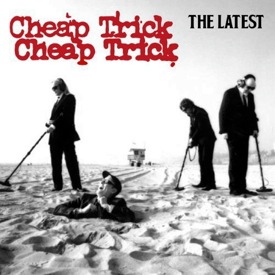
Maximo Park --
Quicken The Heart (Warp)At first, the title of the third Maximo Park album seemed like a cruel joke. This album sounded like a band going through the motions, regurgitating the same old pop songs with slightly slicker production, courtesy of veteran knob twiddler Nick Launay.
And you know what? Despite the fact that my reaction to this album has gone from meh to yay, I’ll admit that Maximo Park hasn’t made major changes since its debut album managed to stand out amongst a crowd of British post-punk inspired acts.
So why does this work? Because Maximo Park is really good at what it does. The band has a sharp sound, with texture and tone. And Paul Smith makes his tales of romance sound of the utmost importance, while he alternatively buys into the melodrama and deflates it, depending on his mood. Moreover, in going back to the band’s debut, I realized just how much tighter and more powerful the band sounds now -- and they sounded pretty sharp back then.
Rubbery bass lines, biting guitars, rock solid drumming and keyboards augmenting melodies are all in place. The killer hooks of songs like “Apply Some Pressure” aren’t in abundant supply, but the hooks do reveal themselves over repeated plays.
The twitchy music fits the fitful mood swinging of Smith. He doesn’t just play the loser in the game of love, as evidenced by songs like “Questing, Not Coasting”, where he shags a gal while they watch a thunderstorm outside a window. But he’s a thinker, hence, when he tries to get sexy, he gets all analytical.
This is reflected in “Let’s Get Clincal”, a cool mid-tempo track with snappy drums and percolating bass and keyboards. Smith puts his cards on the table, crooning “I’d like to map your body out/inch by inch/North to South/and I’m free for circumnavigation.” The band contrasts the jocular verses with some chilly synths and rapid fire drumming in spots, to add the necessary pulp novel atmosphere.
That sense of drama is anticipated by the title of “A Cloud of Mystery”. Here, Duncan Lloyd’s guitar keys the proceedings, with a hint of a ska rhythm in the verses as Smith sings of a girl who is “dressed up/it’s her duty to the town.” Here, Smith is going after the haughty gal that everyone wants, getting a fleeting chance before she took off: “I threw myself into your world/only to come up short.” The song builds to crashing choruses that sound like a mid-point between The Cars and Gene. At least it sounds that way to me.
The callow yet knowing youth that has been at the center of Maximo Park’s songs is growing up, as shown on “I Haven’t Seen Her in Ages (An Opening)”. This uncharacteristically wistful song finds Smith reminiscing about a love that never found its footing and how it still haunts him. As we so often do when dumped, Smith focuses on the best moments of the relationship, while acknowledging that “she ripped me to shreds” and that she is “my ailment.” Again, the music is pleasant mid-tempo pop, with just a hint of post-punk sharpness.
Perhaps the main reason this album didn’t grab me at first is because the band is just a little bit less frenzied, a bit less herky-jerk, even though the general approach is the same. There are still some true rockers in the mix, but the slightly more mature point of view seems to require more reflective settings.
Whatever the case, Maximo Park has won me over again, primarily on the strength of Smith’s personality and lyrics. Because the front man truly drives the band, I’m curious if the band’s music can go much further. I’ll find out in a year or two.




.jpg)





